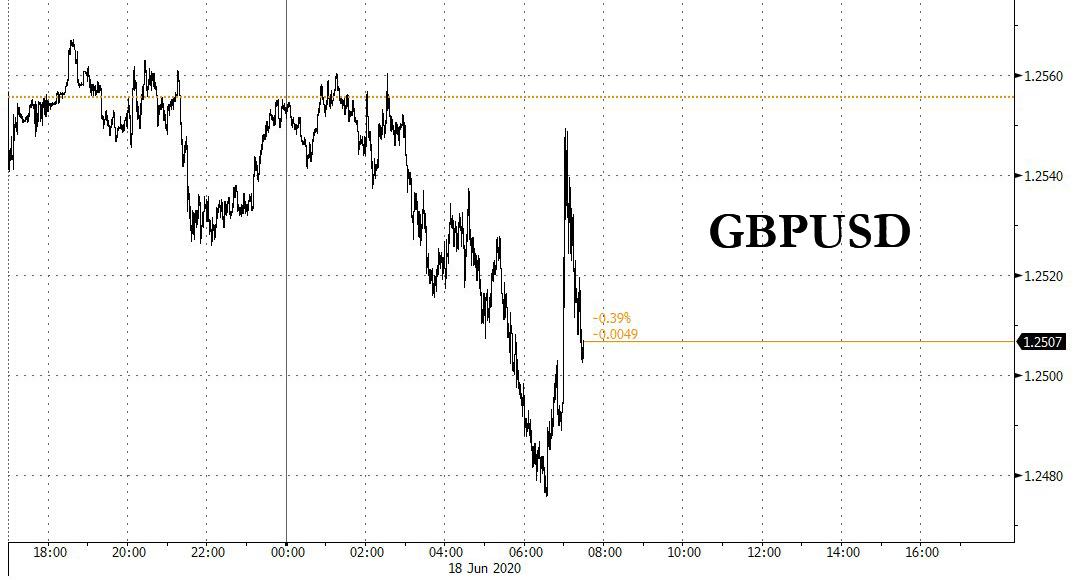Bank Of England Announces Only £100BN QE Expansion In Unexpectedly Hawkish Statement
Tyler Durden
Thu, 06/18/2020 – 07:37
The Bank of England voted unanimously to keep the Bank Rate at 0.1%, as expected, however in a disappointment to some who were looking for an £200BN increase in the asset purchase program, the bank announced that in an 8-1 to vote it expanded its bond buying program by only £100BN, with chief economist Andy Haldane dissenting on additional QE, favoring no change. In a further hawkish surprise, the BOE also said it now expects the £745 billion asset purchase program to be completed around turn of the year even as the U.K. economy takes some time to recover.
At this meeting, the MPC judges that a further easing of monetary policy is warranted to meet its statutory objectives. The Committee agreed to increase the target stock of purchased UK government bonds by an additional £100 billion in order to meet the inflation target in the medium term. The Committee expects that programme to be completed, and the total stock of asset purchases to reach £745 billion, around the turn of the year.
Commenting on the decision, the BOE minutes said that “with liquidity conditions having stabilised, purchases could now be conducted at a slower pace than during the earlier period of dysfunction. Should conditions worsen materially again, however, the Bank stood ready to increase the pace of purchases to ensure the effective transmission of monetary policy.” As noted above, the BOE sexpect the program to be completed “around the turn of the year”.
More importantly for those expecting NIRP in the UK, the outlook was not nearly as negative as expected, and there is no mention of negative rates nor TSFME rate change.
Adding to the hawkish read, the BOE said that “the emerging evidence suggests that the fall in global and UK GDP in 2020 Q2 will be less severe than set out in the May Report. Although stronger than expected, it is difficult to make a clear inference from that about the recovery thereafter. There is a risk of higher and more persistent unemployment in the United Kingdom. Even with the relaxation of some Covid-related restrictions on economic activity, a degree of precautionary behaviour by households and businesses is likely to persist.”
That was not all: as Pantheon’s Sam Tombs points out, the BoE pace of monetization is sharply lower, as the bank will now be buying £6B gilts a week until the end of the year, well down from current £11B pace, “much less than most analysts had assumed.”
My quick calcs suggest the BoE will be buying c.£6B gilts a week until the end of the year, well down from current £11B pace
This is much less than most analysts had assumed pic.twitter.com/gCZsve8zub
— Samuel Tombs (@samueltombs) June 18, 2020
As FX strategist Viraj Patel adds, the “Bank of England’s £100bn QE to year-end means that weekly gilt purchases will slow down to around 40% of current pace. A relatively hawkish move compared to other central banks. Obviously BoE can front-load these purchases but $GBP higher as on a not so aggressive BoE QE move.”
Bank of England’s £100bn QE to year-end means that weekly gilt purchases will slow down to around 40% of current pace. A relatively hawkish move compared to other central banks. Obviously BoE can front-load these purchases but $GBP higher as on a not so aggressive BoE QE move pic.twitter.com/44j6ZrzkZH
— Viraj Patel (@VPatelFX) June 18, 2020
Combined with the smaller than expected QE amount, the statement was generally more hawkish than consensus expected, which explains the spike in cable, which has however since faded much of the gains.
As Bloomberg’s Marcus Ashwroth notes, the 10-year gilt yield’s up on the reduced weekly pace of BOE buying to about 9 billion pounds from 13.5 billion pounds. “Adding to this is Haldane’s dissent on any increase in QE. Although the BOE stressed it could always increase the pace of bond purchases again, the reduction to just two rather than three buying operations sends a clear message that the pandemic response is tapering.“
What happens next? while the bank did not provide much detail on what precise action the central bank could take next should its assessment prove overly optimistic, they made clear officials are ready to do more:
“The MPC will continue to monitor the situation closely and, consistent with its remit, stands ready to take further action as necessary to support the economy.”
As UBS economist Dean Turner writes, “we don’t believe the Bank will take rates lower this summer, let alone into negative territory. We may, however, see some evolution in the funding schemes for banks, to support lending to the economy. This could raise a few eyebrows, but has the potential to be more successful in increasing the flow of credit than cutting base rates alone.”
via ZeroHedge News https://ift.tt/2Ck7tqA Tyler Durden
